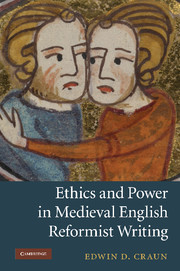Book contents
- Frontmatter
- Contents
- Acknowledgments
- Editorial practices, translations, abbreviations
- Introduction
- 1 Universalizing correction as a moral practice
- 2 Negotiating contrary things
- 3 Managing the rhetoric of reproof: the B-version of Piers Plowman
- 4 John Wyclif: disciplining the English clergy and the Pope
- 5 Wycliffites under oppression: fraternal correction as polemical weapon
- 6 Lancastrian reformist lives: toeing the line while stepping over it
- Postscript
- Notes
- Bibliography
- Index
- CAMBRIDGE STUDIES IN MEDIEVAL LETERATURE
4 - John Wyclif: disciplining the English clergy and the Pope
Published online by Cambridge University Press: 15 April 2010
- Frontmatter
- Contents
- Acknowledgments
- Editorial practices, translations, abbreviations
- Introduction
- 1 Universalizing correction as a moral practice
- 2 Negotiating contrary things
- 3 Managing the rhetoric of reproof: the B-version of Piers Plowman
- 4 John Wyclif: disciplining the English clergy and the Pope
- 5 Wycliffites under oppression: fraternal correction as polemical weapon
- 6 Lancastrian reformist lives: toeing the line while stepping over it
- Postscript
- Notes
- Bibliography
- Index
- CAMBRIDGE STUDIES IN MEDIEVAL LETERATURE
Summary
When Piers Plowman was revised in the mid to late 1380s, the reviser (mostly likely Langland himself) sheared off all material encouraging subjects to reprove disciplinary superiors in the Church and all material extending fraternal correction from individuals to social groups. Gone in the C-version is Clergie's hefty reproof of hypocritical clerical correctors, plus his forceful assertion that the highest form of moral life for all Christians is to reprove sinners boldly. Gone is Lewte's apostolic precedent of Peter rebuking Paul, his firm claim that it is licit for “lewed men” to correct superiors, and the sly “fratres” that makes the convent of Will's confessor, even all friars, a biblically authorized target of correction. Even Will's original accusation against the friars is cut to less than a third, with any reference to the friars as a community removed. Only Will's confessor is rebuked (a traditional pastoral rebuke of a single person who has sinned directly against the reprover), and he sins only by abandoning Will in his penury. All that remains of the heart of the third vision's sequence on correction of sin is Lewte's general insistence that correction is necessary if religious law is to be observed, plus his cautions about making private sin public. Even those are refocused on the needs for corrective speech to be accurate and for the speaker to be loyal to institutions.
- Type
- Chapter
- Information
- Ethics and Power in Medieval English Reformist Writing , pp. 85 - 100Publisher: Cambridge University PressPrint publication year: 2010



